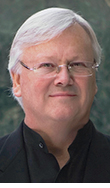AS+GG’s sustainable city design selected for Kazakhstan expo

Adrian Smith
[Adrian Smith + Gordon Gill wins Kazakhstan Astana World Expo 2017 competition] (http://www.bustler.net/index.php/article/adrian_smith_gordon_gill_wins_kazakhstan_astana_world_expo_2017_competition/)
Expo City, the focal point of [Expo 2017] (http://www.expo2017astana.com/en) in Astana, Kazakhstan, a world’s fair showcasing the latest developments in renewable energy sources, will be built from a design by a Chicago firm co-founded by Adrian Smith, an [outstanding alumnus] (http://www.arch.tamu.edu/community/formerstudents/outstanding-alumni/past-honorees/128/) of Texas A&M’s College of Architecture.
The 430-acre design, by [Adrian Smith + Gordon Gill Architecture] (http://smithgill.com/) , was chosen from 105 proposals submitted by some of the world’s most prestigious firms.
Expo City will feature an abundance of self-sustaining exposition buildings, pavilions, retail, art and performance spaces, as well as hotel, residential and office accommodations powered by renewable resources.
'The form and material expression of the buildings was based on their energy performance … specific to the site and culture,' said Smith.
The city’s defining structure will be Kazakhstan Pavilion, a sphere covered by a unique skin that will reduce thermal loss and interior solar glare. The pavilion will be powered by photovoltaics and a host of integrated systems.
Smith’s involvement in Expo 2017 is just one of his many high-profile [projects] (http://archcomm.arch.tamu.edu/archive/news/fall2010/stories/Smith_Burj.html) .
He designed the Burj Khalifa, the world’s tallest building, which rises more than half a mile tall in the United Arab Emirates. Several of his designs are also among the 10 tallest buildings in the world, including the Nanjing Greenland Financial Center, Trump International Hotel & Tower in Chicago and the Jin Mao tower in Shanghai.
After the expo, expected to draw 3-4 million visitors, the complex will be the basis of a sustainable community, said AS+GG partner Robert Forest. Expo buildings will be converted into an office and research park to attract international companies and entrepreneurs, with parking and service zones transformed into hotels, local markets, civic and educational facilities and approximately 700 residential units.
“The design will be a catalyst for research and development, which will create new industries, unique skill sets and new job opportunities,” said Forest.
Despite its status as a major oil exporter, Kazakhstan, a central Asian nation once part of the Soviet Union, is looking to increase its uwse of renewable energy.
Next Post
Tags
- architecture
- class acts
- competitions
- energy
- global college
- honors
- land development
- planning
- sustainability
- technology
Related Posts

Essay highlights professor emeritus’ social activism
Outstanding alum chosen to receive honorary Ph.D.

Noted South African developer to lecture on de-urbanization

Posters, addresses earn students 2017 research week honors

College honored outstanding alumni at Oct. 14 ceremony
Follow Us
Facebook Twitter Vimeo Youtube Flickr RSS
Recent Posts

Planning prof heads study of disaster housing aid

A message from the dean

Former student remembered as expert planner

Leading educator named new head of Architecture Dept.







_thumbnail_small.png)
